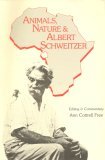- Biblia
- Leer la Biblia
- Versiones de la Biblia
- Verso del dia
- Planes de lectura
- Versos por tema
- Books of the Bible
- Imágenes De La Biblia
- Estudio
- Comentarios
- Concordancias
- Diccionarios bíblicos
- Enciclopedias bíblicas
- Sermones
- Bible Atlas & Maps
- BP Wiki
- Devocionales
- Devocionales de hoy
- Light of the World
- Todos los devocionales
- Inspirational Quotes
- Más
- Picture Quotes
- Videos
- Inspirador
- Estudio Bíblico
- Lo que dice la Biblia
- Bible Q&As
- Daily Bread
- Bible by Genre
- Bible Stories
- Random Bible Verse
- Comunidad
- Store
Animals, Nature and Albert Schweitzer
by Albert Schweitzer
This unique and highly-acclaimed small volume shows - primarily through Dr. Schweitzer's own words - how his philosophy of "reverence for life" developed, from childhood, as his long life unfolded.
It demonstrates how the philosopher-physician-musician carried out his philosophy at his African hospital, in Europe and the U.S.A and how he inspired the animal protection and environmental awakening.
It demonstrates how the philosopher-physician-musician carried out his philosophy at his African hospital, in Europe and the U.S.A and how he inspired the animal protection and environmental awakening.It describes his bond with individual animals and how he coped with the paradox of the "will-to-live" vs. "the will-to-live."
It describes his bond with individual animals and how he coped with the paradox of the "will-to-live" vs. "the will-to-live."His memorable words, the sensitive commentary and the appealing photographs combine to present forcefully and gracefully Dr. Schweitzer's guidance to all persons troubled by disrespect of the natural word and all that dwell therein.
His memorable words, the sensitive commentary and the appealing photographs combine to present forcefully and gracefully Dr. Schweitzer's guidance to all persons troubled by disrespect of the natural word and all that dwell therein.This book, which was originally published in 1982, has gone into eight printings.
This book, which was originally published in 1982, has gone into eight printings.Hardcover, 96 pages
Published September 1st 1989 by Flying Fox Press, the (first published June 1982)
tags: biography
Suscribir
© 2025 Bibleportal.com Reservados todos los derechos.

Albert Schweitzer was born into an Alsatian family which for generations had been devoted to religion, music, and education. His father and maternal grandfather were ministers; both of his grandfathers were talented organists; many of his relatives were persons of scholarly attainments.
Having decided to go to Africa as a medical missionary rather than as a pastor, Schweitzer in 1905 began the study of medicine at the University of Strasbourg. In 1913, having obtained his M.D. degree, he founded his hospital at Lambarene in French Equatorial Africa, but in 1917 he and his wife were sent to a French internment camp as prisoners of war. Released in 1918, Schweitzer spent the next six years in Europe, preaching in his old church, giving lectures and concerts.
... Show more